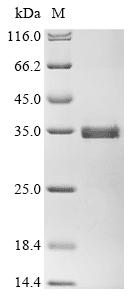The muscarinic acetylcholine receptor mediates diverse cellular responses by activating G proteins. Its primary transducing effect is the inhibition of adenylate cyclase, reducing cyclic AMP levels. Additionally, receptor signaling activates phospholipase C, leading to the hydrolysis of phosphoinositides and the generation of inositol trisphosphate (IP3). IP3 subsequently triggers the release of calcium ions from intracellular stores into the cytosol, facilitating various downstream signaling processes. The receptor also modulates potassium channels, influencing membrane potential and cellular excitability. Through these mechanisms, the muscarinic acetylcholine receptor regulates vital physiological functions such as neurotransmission, smooth muscle contraction, and glandular secretion, highlighting its importance in maintaining cellular signaling and systemic homeostasis.
Home
>
Recombinant Proteins
>
Recombinant Human Muscarinic Acetylcholine Receptor M2 (CHRM2) Protein (His)

